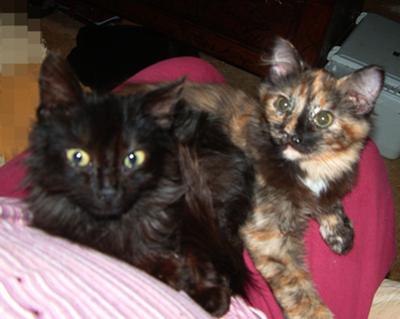
Cassie and Mandy spayed
Do cats need pain medicine after spay/neutering? I really need your input on this one readers. Also on the time to feed a pet after the surgery.
Let me explain the way things are done in my area. Food and drink are withheld after 11p.m. the night before the surgery. Then between 7:30-8:30 a.m. my cats Mandy and Cassie were dropped off at the Humane Society clinic, paperwork is filled out, and my cats had surgery to be spayed.
At 4:30p.m. I was allowed to pick up my cats with instructions on how they were to be cared for. The clinic stresses they can have dry food but no water until the next morning. They said the cats are too out of it they need to stay in the carrier overnight and drinking water could lead to choking.
My cats were not sent home with any pain medication. This is not unusual for me, but I ended up facing a LOT of criticism on Facebook. Most on the absence of pain medication, a few on the holding back of food and water.
Let me say Mandy and Cassie took a LONG nap that lasted until 10pm. Although they were plastered (term for seriously drunk) when they arrived home, they were sober after the nap and both ate and drank before going back to bed.
Neither of them seemed in much pain. Mandy even went to bed with me and was relocated back to the living room when she tried to sleep on my face.
At what point do all of you feed your cats after surgery? Especially spaying, which is more intrusive than the neutering the males go through.
Now lets move onto the pain medication after spaying. I'm not even going to involve internet references. It's just much easier to describe what I've been through.
I've adopted cats from Pickens, Oconee, Greenville, Greenwood and Anderson Counties in S.C. and the surgery was required before the animal left the shelter. I've had strays operated on at private vets who didn't give pain medicines post-surgery.
Their argument is they want the cat in a little pain because if the cats were too active it could pull the glue or stitches and the incision site could open. This happened with Lola last year and she had to go back to the clinic and be reglued. Here's the story link with Lola's incision when it opened up from playing too hard after the operation: We had a bad week by Furby.
I'd like to throw in my observations that the incision is WAY smaller than years ago. So the surgery probably isn't as painful as in the old days.
I've heard from a few vet techs and a few cat owners who stress the importance of a pain free cat. After all, a cat not in pain will eat and drink more than a cat who is suffering.
So what can all of the cat lovers at pictures-of-cats.org tell me about pain medicine and feeding protocol?
I'm curious to see if the no pain medicine clinics are the norm or just in the state I live in (South Carolina).
I feel I used good old-fashioned common sense in my decision to feed them later that night.
Comments anyone? How did you handle neutering or any other major cat surgery? And when do you feed post surgery.
Elisa
From Do Cats Need Pain Medicine After Neutering? to Cat Health Problems





I think if the cats were given the choice I am sure they would pick the medication. They do not have a voice. For the $25. I would not deny my cat a possible pain free experience. I have had surgery myself and could not imagine someone telling me that I was denied pain meds or if someone told me that I would heal better if I did not move around too much so therefore it would be better to not have pain medication. Try to be a responsible owner with a heart. Give them the meds they deserve